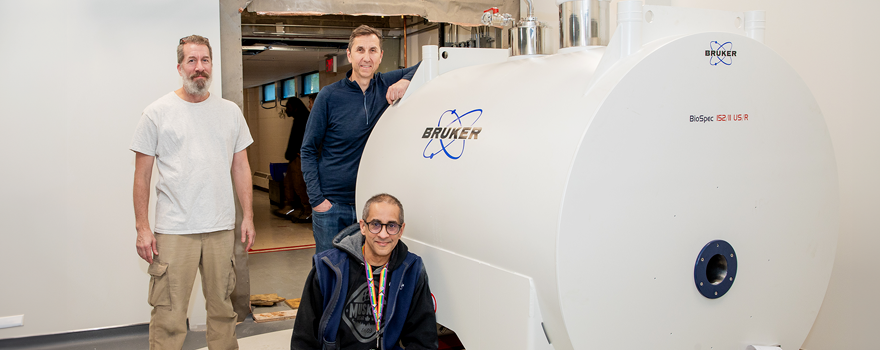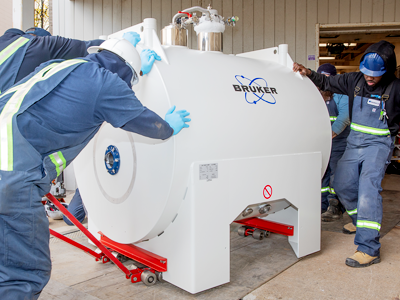Canada’s most powerful MRI system arrives at Schulich Medicine & Dentistry
 Bob Walters, a field service engineer with Bruker (left), Joe Gati (centre) and Ravi Menon (right, kneeling) on site at the Centre for Functional and Metabolic Mapping for the arrival of the 15.2T MRI system. (Christopher Kindratsky/Western Communications)
Bob Walters, a field service engineer with Bruker (left), Joe Gati (centre) and Ravi Menon (right, kneeling) on site at the Centre for Functional and Metabolic Mapping for the arrival of the 15.2T MRI system. (Christopher Kindratsky/Western Communications)
By Emily Leighton
The Centre for Functional and Metabolic Mapping (CFMM) at Western University’s Schulich School of Medicine & Dentistry is now home to Canada’s first 15.2 Tesla magnetic resonance imaging (MRI) system.
The $6-million pre-clinical scanner – only the second of its kind in North America and sixth in the world – is a boost for neuroimaging research at Western, enabling researchers to study the brain with unprecedented resolution.
The new MRI system arrived in November and will support interdisciplinary research focused on neurological disorders – including pioneering research in neuroimmunology led by newly announced Canada Excellence Research Chair Dr. Robyn Klein and a multi-centre project focused on drug development for neurological conditions led by Ravi Menon, PhD.
“This is one of the most powerful MRI systems in the world,” said Menon, professor and scientific director of CFMM. “The unprecedented spatial resolution and unique image contrast will help advance our understanding of neurological processes and assess new treatments in mouse models of disease.”
 Arriving by truck, the 15.2T MRI system was carefully moved into place at CFMM on November 15. In total, it was an 11-hour delivery process. (Christopher Kindratsky/Western Communications)
Arriving by truck, the 15.2T MRI system was carefully moved into place at CFMM on November 15. In total, it was an 11-hour delivery process. (Christopher Kindratsky/Western Communications)
It also offers exciting opportunities for trainees to gain hands-on experience with cutting-edge technology and advanced imaging techniques.
CFMM, located at Robarts Research Institute, houses Canada’s most advanced ultra-high field MRI platform, including Siemens 3T and 7T human MRI scanners and a Bruker 9.4T preclinical scanner.
MRI systems use a high-powered magnetic field to capture precise and extremely detailed images. Tesla is the scientific unit used to quantify the strength of this field, with higher tesla values indicating a stronger magnetic field and therefore, higher image resolution.
The Bruker 15.2T preclinical system will be housed in a biocontainment level 2 facility at CFMM, carefully designed by Joe Gati, managing director at CFMM, and his team for research involving infectious pathogens and other biological materials.
“With the 15.2T MRI system, Western will be well-positioned to attract top-tier researchers and collaborators and expand its leadership in imaging and neuroscience research,” said Menon.
The system is expected to be ready for use by mid-2024.







